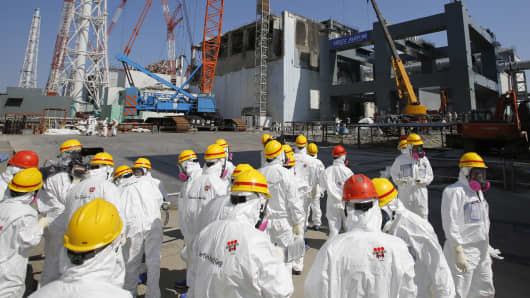A cheap currency may drive energy prices up beyond the threshold of pain for consumers and businesses, said Alex Ashby, research analyst at Global X Fund, with close to $2 billion in assets under management.
In that context, the government may be forced to consider restarting the country's arsenal of nuclear power plants, which provide affordable juice for the nearly $6 trillion economy.
"If you look at the cost of [idle nuclear plants], Japan has to rely much more heavily on energy importing to meet their economic needs," Ashby said. "Obviously, as costs escalate, it makes businesses difficult to compete."
Certain factors underscore how events might conspire to force Japan's hand on the nuclear issue.
Japan's own Ministry of Economy, Trade and Industry estimates the nuclear shutdown is costing the utility companies around $13 billion a year—a real strain on an economy mired in recession. Meanwhile, market prices for uranium have plunged 40 percent since Tokyo shut down the country's reactors, which could make it cheaper for the country to fire up its nuclear plants again.
Elsewhere, Prime Minister Shinzo Abe is currently embarked on a world tour to strengthen ties to energy producing countries like the United Arab Emirates. That could work to Japan's benefit in two ways: helping other countries benefit from Japan's nuclear know-how, as Tokyo cajoles them into getting a break on its oil and gas bills.
Yet some say it appears unlikely Japan will switch back to nuclear power anytime soon. In the wake of Fukushima, the issue has become a political football, while the ruling Liberal Democratic Party has made no concrete effort to crank up the country's idle reactors.
Additionally, stoking higher prices is an explicit policy objective by the Bank of Japan, says Alessio de Longis, a portfolio manager at OppenheimerFunds. He acknowledges that high energy prices could eventually force the BOJ to rein in a weak yen and cheap money. At present, the central bank hasn't reached that point of no return.
"For Japan, the very first chance at succeeding at [higher inflation] is getting it done through a weaker yen and the immediate impact on inflation. That is accomplished exactly through import price inflation, which is dominated by energy imports," he said.
Thus far, that strategy appears to be playing out in the favor of Japan's monetary authorities. In March, Japanese crude imports soared by 7 percent, while LNG imports jumped by 8.8 percent. According to data from the International Group of LNG Importers, Japan imported more than 108 billion cubic meters of LNG in 2012, which comprised nearly 40 percent of global demand for the energy source.
"Paradoxically, it's the growing reliance on foreign energy and food gives the BOJ a higher probability of succeeding in the immediate future," Oppenheimer's de Longis said.
—By CNBC's Javier E. David



